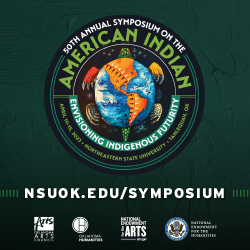There is something for everyone at the annual Symposium on the American Indian at Northeastern State University, said Director of the Center for Tribal Studies Sara Barnett.
Evolving from a one-day event bringing together Native American scholars 50 years ago, the symposium has become a premier, weeklong celebration of Native American culture, scholarship and fellowship on the Tahlequah campus attracting individuals from all walks of life from across the United States and globally.
On April 10 to 15, K-12 and college students, educators, professionals and community members will gather at the Tahlequah campus to celebrate the 50th anniversary of the symposium.

“The symposium is unique in that we provide an opportunity to hear from some of the top Indigenous scholars who come from all over the United States and Canada, in a conference venue that removes the financial barrier for many attendees,” Barnett said. “This openness and accessibility continue to be one of our top priorities and adds a great deal of significance to the symposium.”
Along with more conference-style presentations from Indigenous scholars, she said other activities slated include traditional games, a student poster presentation, short-film discussions and the return of the symposium fashion show. The symposium will conclude with the fan-favorite NSU Powwow.
For the 50th anniversary, the theme is “Envisioning Indigenous Futurity.”
“Many times, the narrative around the American Indian experience is centered in a more historical context, which may focus on more trauma than our resilience,” Barnett said. “By focusing on our hope for the future, we not only reclaim our space in the present but also let the upcoming generation of young Native people know we are doing our best to lay a path forward for them and are confident in the future of our Nations under their leadership.”

With futurity as the central theme for this year’s symposium, NSU has invited Indigenous scholars Dr. Doug Kiel (Oneida Nation), Dr. Miranda Belarde-Lewis (Zuni/Tlingit) and Dr. Laura Harjo (Muscogee (Creek) Nation) to deliver the keynotes this year.
Harjo currently serves as the associate professor and interim chair in the department of Native American studies at the University of Oklahoma. She has researched and authored publications on Indigenous views of space and place and serves on a number of editorial and advisory boards for national journals and presses.

During the opening ceremony, which starts at 9:30 a.m. on Wednesday, April 12, Harjo will discuss her most recent book “Spiral to the Stars: Mvskoke Tools of Futurity.” In her book, she discusses Indigenous futurity within the context of kinship, space, and time. The presentation will take place on the second floor of the University Center.
Belarde-Lewis serves as an assistant professor of North American Indigenous Knowledge at the University of Washington. She was also named as the inaugural Jill and Jo McKinstry Endowed Faculty Fellow of Native North American Indigenous Knowledge. Her scholarship is centered on the discussion of how American Indian history and art is depicted in museums across the country.

Her presentation will discuss the how and why behind the use of Tribal art forms, symbols and materials, placing American Indian people at the center of their own stories. Belarde-Lewis will present on Thursday, April 13 from 1 to 1:50 p.m. on the second floor of the University Center.
Kiel is a Native American historian focused on research related to Indigenous populations in the Great Lakes region, specifically these Nations’ efforts to rebuild in the last century. He is also an assistant professor in the department of history and the Alice Kaplan Institute for the Humanities at Northwestern University, where he is also affiliated with the new Center for Native American and Indigenous Research.

Kiel will highlight various historical and contemporary endeavors to get Indigenous #LandBack, including through the tribal co-management of federal public lands as part of his presentation on Friday, April 14 from 11 to 11:50 a.m. on the second floor of the University Center.
Funding for this program is provided in part by a grant from the Oklahoma Humanities and the National Endowment for the Humanities. This project was also supported in part by the Oklahoma Arts Council, which receives support from the State of Oklahoma and the National Endowment for the Arts.
For a complete schedule of events, visit nsuok.edu/symposium, call 918-444-4350 or email tribalstudies@nsuok.edu.






